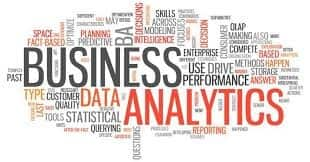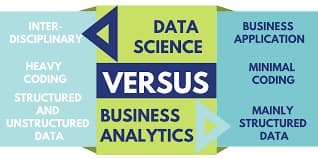Great Lakes Institute of Management PGPM Admissions 2026
Application Deadline: 10th March | Globally Recognized by AACSB (US) & AMBA (UK) | 17.8 LPA Avg. CTC for PGPM 2025
Analytics is a booming field right now and there is a heavy demand for analytics professionals. An MBA in Business Analytics will give you an overall understanding of how the analytics industry works as well as what role you would be required to perform. You may want to tap into this challenging and demanding field if you have an analytical mindset or an interest in statistics. The multidisciplinary MBA in Business Analytics covers technical, corporate, management, leadership, and communication training as well as business-analytical qualifications.

The MBA (Analytics) program at IIM Kashipur is a two-year full-time residential program which aims to prepare managers and future leaders who will shape the increasingly technology-oriented and data-driven world. It focuses on grooming its students to acquire knowledge, skills and attitudes for leadership profiles so that they can seamlessly navigate the ever-changing business landscape. The primary objective of the institute is to nurture the students through a balanced mix of academics, industry exposure and co-curricular activities. Here in this article Deshmaa RT and Sakshi Poddar of MBA (Analytics) 2020-22, Indian Institute of Management Kashipur provide an overview of why and what all parameters one must consider before giving a thought of pursuing MBA in Analytics.


An MBA trains business leader, including managers, and your primary area of education in business and management. Your MBA program, including "hard" and "soft" business skills, gives you a strong understanding of business fundamentals. This is taught in a fixed sequence of necessary courses or "core courses.” Some of the classes you may encounter as part of your MBA core include:
· Accounting
· Finance
· Marketing
· Ethics
· Operations
· Macroeconomics
· International Business
· Microeconomics
· Human Resources
· Leadership
Your concentration on business analytics will delve into specific business analytics and data expertise and also teach you to understand business issues via a data-driven lens. The most advanced business analysis tools, case studies, and projects, including real-world data, allow you to practice practically. Some of the classes you may see offered as part of a business analytics MBA concentration include:
· Spreadsheet Modelling
· Accounting Analytics
· Marketing Analytics
· Financial Analytics
· Business Statistics
· Applied Regression
· Principles of Management Science
· Data Mining
· Forecasting and Modelling
· Business Computing
Data science vs Business Analytics are separate disciplines, which are quite often used interchangeably. A layman may not be so concerned with this interchangeability, but professionals have to use the words appropriately, since they have a broad and immediate effect on the company.

A Business Analyst's job includes researching and extracting useful information to clarify business performance (present and future) from data sources. The correct plan to develop the organization is often decided by a Business Analyst. Whereas, Data scientists gather, analyze, and interpret broad data sets and use their analytical, mathematical, and programming skills to decipher valuable insights for solving difficult business problems. The three major factors that differentiate business analysts from data scientists are overall responsibilities, skill sets, and user interaction.
Overall responsibilities: The functional requirements that inform IT system design is provided by business analysts. On the other hand data scientists derive significance from the data generated and processed by such systems. Data scientists may also simplify the activities of the company analyst and be able to provide some of the market insights. Taking monetary benefits into consideration business analysts are slightly paid more than data analysts.
Skill Sets: Business analysts need data science expertise as well as skills related to communication, critical thinking, negotiation, and management. Whereas, data analysts need similar skills with a more in-depth emphasis on technological data manipulation.
User interaction: Business analysts also have more direct contact with system users, clients, system developers, and others as project facilitators and managers than data analysts do. That's because market analysts will also interview individuals and learn more about how to enhance technology to help business processes. During the course of a single project, they work collaboratively with others. While data analysts can initially collaborate to define important data sets with internal subject matter experts, the majority of their work is performed independently.
Considering business analytics and data science domain, the former attracts the target base more owing to its business coherence and state of the art application-related job role. Apart from these there are few more benefits of pursuing business analytics which are as follows:
More informed decision making: Business analytics can be a valuable resource when approaching a substantial strategic decision. For example, when the company needs to analyze its product line update, business analytics can be applied to determine whether the updated product has resulted in faster service, more precise recommendations for resolution, and higher scores of customer satisfaction are achieved.
Improved operational efficiency: Analytics, beyond financial benefits, can be used to fine-tune company processes. Business analytics can be used to forecast business operations and assist the company by more effectively timing maintenance, enabling it not only to save operating costs, but also to ensure that it maintains assets at optimum levels of performance.
As digitization has become a buzz in recent times with technology and data being utilized from local grocery shops to well-sophisticated malls, the demand for business analysts also has increased significantly. Moreover, as per the statistics, for every hour, terabytes of data are generated by 6 billion connected devices. With this increasing demand, there is an insufficient supply of professionals.
From the above-mentioned courses offered by MBA institutes, one can get the knowledge of the following skills: Python, SQL databases, and R, Survey/query software, Business intelligence, and reporting software, Data visualization, Database design, Problem-solving skills, Effective Communication, Creative Thinking and Industry Knowledge. These help them to be the best fit for diversified job roles, which include data analyst, supply chain analyst, big data analyst, business analyst, marketing analyst, finance analyst, HR analyst, etc. The increasing demand for MBAs with analytical skills has made Business Analytics a relatively new and popular specialization in the management domain.
There is a shortfall of 1.5 million analysts, according to a report by the McKinsey World Institute. With an MBA in Business Analytics, you are eligible for a large range of careers, including popular C-suite jobs. This is because MBA graduates are qualified to hold leadership positions in a number of business environments. In all types of businesses, health industry marketing, supply chain management, data-driven decision-making is increasingly in demand. Based on their domain knowledge, skills and work experience, companies typically offer these job roles to candidates. The high demand for professionals with an MBA in Business Analytics is generated by MNCs, retail and manufacturing companies, IT companies, e-commerce companies, consultancies, telecommunications companies and business analytics and intelligence companies. MBAs are also hired not only by MNCs but even by startups. As an MBA is primarily a business degree in Business Analytics, you will not be looking at data science work. You'll be eligible for data-driven positioning instead. You will also have the advantage of competing with a background in analytics for more general positions in business management.
Application Deadline: 10th March | Globally Recognized by AACSB (US) & AMBA (UK) | 17.8 LPA Avg. CTC for PGPM 2025
NAAC A++ Accredited | AMBA & AACSB Member | Highest CTC 16.22 LPA | Merit-based Scholarships | Last Date: 25th Mar'26
To conclude, the MBA in Business Analytics is an upcoming field of expertise in all sectors of the industry that is gaining increasing traction. The specialization demonstrates a positive and promising outlook, and you can go ahead and begin your MBA journey in Business Analytics for those of you who have long been skeptical about choosing this career path!
On Question asked by student community
Hello,
For the long run in the industry, MBA (Analytics) from IIM Kashipur is generally considered more beneficial than an MBA from IIT Kharagpur (KGP), especially for those seeking a career in business analytics or consulting. While IIT KGP offers a strong technical foundation, IIM Kashipur provides a more balanced
Hello Kunal,
With 77.48 percentile (OBC) and 7/7/7 academics, here’s a concise guide:
IIMs to Target
Hello Greetings
IIM Kashipur's MBA Analytics program is a two-year full-time residential course that focuses on developing advanced analytical and managerial skills for data analysis, enabling better decision-making in organizations .
The program's key highlights include:
- *Ranking*: IIM Kashipur is ranked #19 among top 125 B-schools in the NIRF
Hello Sridhar,
Greeting of the day !
To answer your question, YES you do have a chance. It solely depends on your profile, and your performance in the GD-PI rounds. Also good extra-curricular, and co-curricular activities would be a pro for the same.
Wish you Best of Luck !
Thank
Hello Param,
Hope you are doing well !
To answer your question, NO, work experience in not compulsory for MBA in Business Analytics from IIM Kashipur.
Though, having work experience would definitely help in your interview, and further ahead in your career, but it is definitely not compulsory.
Hope I
Ranked among top 10 B-Schools in India by multiple publications | Top Recruiters-Google, MicKinsey, Amazon, BCG & many more.
Industry Internship Training
NAAC A++ Accredited | Ranked #12 by NIRF
Recognized as Category-1 Deemed to be University by UGC | 41,000 + Alumni Imprints Globally | Students from over 20+ countries
Highest CTC International 23.31 LPA | Highest CTC Domestic 12.5 LPA | Average CTC 7.5 LPA | Avail Merit Based Scholarships
MBA Admissions Deadline 28th Feb'26 | UGC Approved Programs | Near 100% Placement Record | Up to 100% Scholarships | Highest CTC 21.32 LPA